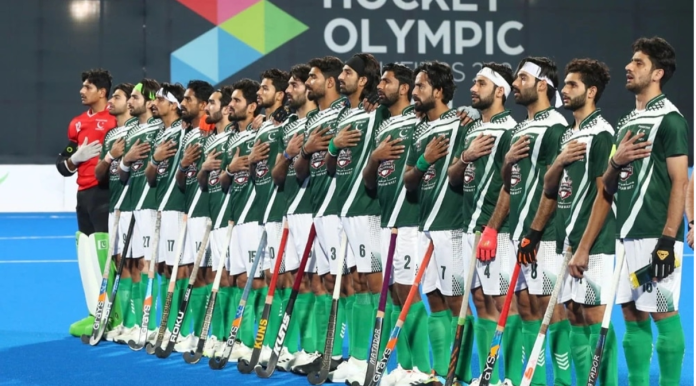The recent invitation extended to Pakistan’s national hockey team to participate in the prestigious FIH Pro League 2026–27 season presents a rare and much-needed opportunity for the revival of Pakistan’s national sport. With the deadline to confirm participation looming—August 11, 2025—the urgency of the matter cannot be overstated. Pakistan earned this chance after finishing second in the FIH Nations Cup, as New Zealand, the winners, declined their Pro League spot due to financial constraints. Now, Pakistan stands at the brink of reentering elite international hockey—but only if it overcomes one critical hurdle: funding.
The Pakistan Hockey Federation (PHF) has expressed serious concerns regarding financial resources. With barely days left to confirm their participation, the lack of clarity and support could result in Pakistan missing out on one of the most significant international hockey events. This situation demands immediate and coordinated intervention from all stakeholders—the federal government, Pakistan Sports Board (PSB), and corporate sponsors.
Hockey in Pakistan is not just a sport; it is a cornerstone of the nation’s sporting legacy and a source of immense national pride. Pakistan was once a dominant force in world hockey, having won four World Cup titles and three Olympic gold medals. However, in the past two decades, the sport has suffered a steep and heartbreaking decline. The causes are manifold: chronic mismanagement within the PHF, lack of government support, inadequate grassroots development, and insufficient exposure to international competition.
Yet, despite all these issues, the nation still retains a deep emotional connection with hockey. The sport is embedded in the fabric of Pakistan’s history. The invitation to the FIH Pro League offers a timely and golden opportunity to revive that legacy, reengage fans, and inspire future generations.
The FIH Pro League is not just another tournament—it is the premier international hockey league, featuring the best teams in the world, including Australia, the Netherlands, Germany, and India. Participation in the Pro League provides high-quality match exposure that is essential for player development. It also improves global rankings and opens up opportunities to qualify for mega-events such as the Olympics and the World Cup.
Playing regularly against top-tier opponents will give Pakistan’s players invaluable experience, tactical exposure, and the competitive conditioning required to return to the world stage. This long-term investment in the national team is bound to pay dividends by enhancing performance, improving infrastructure, and reigniting public interest.
Recognizing the importance of this opportunity, the federal government must act immediately. A recent high-level meeting of the Ministry of Inter-Provincial Coordination (IPC), chaired by PM’s Adviser Rana Sanaullah, specifically addressed the issue. In the meeting, the PHF was asked to submit a comprehensive breakdown of the expenses required for Pro League participation. The adviser also raised concerns about the transparency of PHF’s internal affairs and called for proper accountability before disbursing any funds.
While transparency and accountability are essential, this should not delay critical funding for an opportunity that has come after years of isolation from elite-level hockey. The ministry must work in tandem with the PHF to ensure funds are released in time while simultaneously ensuring financial discipline and oversight.
In parallel, corporate sponsors—many of whom generously support cricket and football—must step forward. Hockey has a loyal and passionate fanbase and deserves to be supported as a national cause. The Pro League, with its media coverage and global viewership, also presents a strong branding opportunity for companies to associate with a sport of historical importance in Pakistan.
The conduct of the Pakistan Sports Board (PSB) also warrants serious scrutiny. While it is mandated to promote sports in the country, its actions toward hockey have often appeared counterproductive. In recent months, PSB significantly increased fees for the use of national hockey grounds, rendering them unaffordable for most clubs.
As a result, no regular hockey club is currently practicing at the main hockey venues, and the facilities are now deteriorating due to lack of use. This not only hampers talent development but also threatens the upkeep of national infrastructure built for the sport. Adviser Rana Sanaullah highlighted this issue in the recent IPC meeting and instructed PSB to reconsider its fee structure and policies, which have been detrimental to grassroots hockey.
The PSB must revise its approach. Supporting national sports requires more than administrative oversight; it demands enabling conditions for practice, development, and performance.
In addition to government and corporate support, the hockey community and the public at large should consider launching crowdfunding initiatives. In the age of digital platforms and social media, mobilizing public sentiment can be a powerful tool. A campaign to support Pakistan’s return to international hockey could galvanize widespread support and bring in supplementary funding, even if modest.
Furthermore, such an initiative could build community ownership of the sport’s revival. When the public invests emotionally and financially, it also holds institutions accountable. This two-way engagement can lay the foundation for a sustainable revival of hockey in Pakistan.
New Zealand’s refusal to join the Pro League due to financial reasons reflects the harsh reality of global sports financing, particularly for smaller nations. However, Pakistan must not follow suit. Unlike New Zealand, which has other thriving sports to bank on, hockey remains Pakistan’s most historically successful sport. Missing this chance would be nothing short of a tragedy.
Pakistan has already proven its potential by reaching the final of the Nations Cup. The team is on an upward trajectory, and international exposure could accelerate its progress significantly. With high-level competition, the players will gain confidence, sharpen their skills, and carry the momentum into qualification events for the 2028 Los Angeles Olympics.
Pakistan hockey stands at a defining moment. The FIH Pro League invitation is a beacon of hope—one that signals the country’s potential reentry into the highest echelons of global hockey. The responsibility to seize this opportunity does not rest on the PHF alone. The government, corporate sector, and civil society must all play their roles.
The Ministry of IPC must ensure quick and accountable disbursement of necessary funds. The PSB must rethink its anti-hockey policies and remove obstacles to grassroots development. The PHF must embrace transparency and professionalism. And the corporate world must realize that investing in hockey is not charity—it is nation-building.
The time to act is now. Any further delay could mean forfeiting a chance that may not come again soon. Pakistan must respond positively to the FIH invitation by August 11, 2025, and begin preparing to return to where it belongs—among hockey’s elite.

















